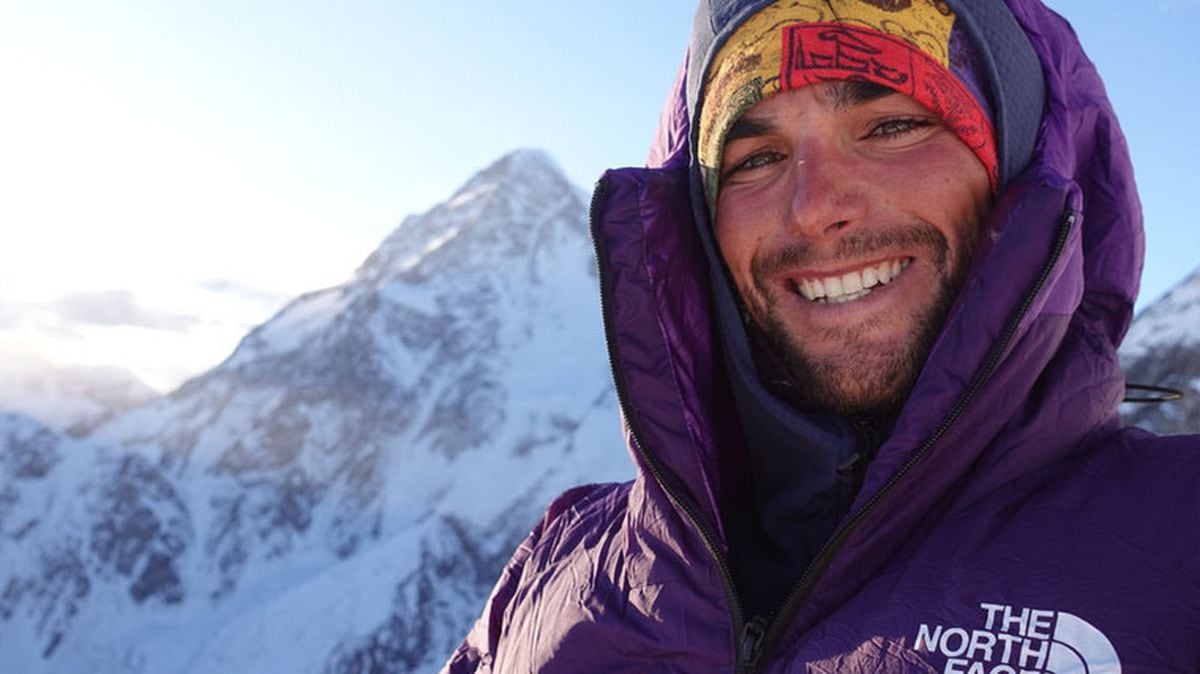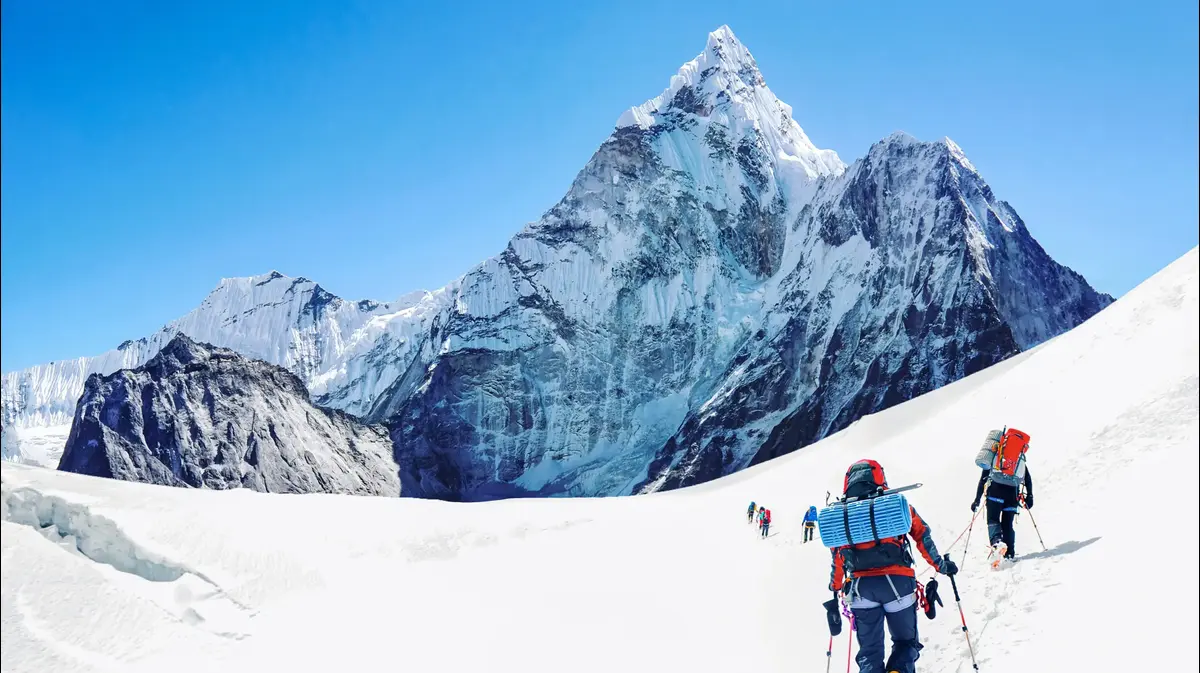Hermann Buhl, the man who in 1953 defied all written laws, and also his expedition leader, to sign alone the first ascent of Nanga Parbat (8,125 m), would never have imagined that he would inspire so many avid climbers, like him, of lightness and speed;
such was the case with Reinhold Messner and Peter Habeler.
The French, too, always wanting to transfer to the Himalayas their impressive link-ups and lightning ascents in the Alps.
From Benoît Chamoux to Marc Batard through Christophe Profit, Jean Christophe Lafaille or Pierre Béghin, the French penchant for economy of means has always been relevant.
The Frenchman Benjamin Védrines has just climbed another step to establish a speed record in a simply amazing
eight
thousand: 7 hours and 28 minutes from the base camp to the top of Broad Peak (8,047 m) to overcome a drop of 3,147 meters at an altitude where just walking is a challenge.
More information
Against the temptation to ban mountaineering
In 1957, Hermann Buhl himself was among the four Austrian climbers who signed the first ascent of Broad Peak: he barely reached the top, very tired and worried about the frostbite suffered on Nanga Parbat and that still tortured him.
He was, after the Sherpa Gyalzen Norbu (Makalu, 1955 and Manaslu, in 1956), the second man to achieve two firsts at
eight thousand
, and his legend remains immense, perhaps because he disappeared days later in neighboring Chogolisa.
Fritz Wintersteller, Marcus Schmuck, Kurt Diemberger and himself signed a futuristic ascent, dispensing with Sherpas, bottled oxygen and advancing in alpine style and, although they roped the most delicate sections, their avant-garde approach pointed the way forward for future generations.
Benjamin Védrines, during his record ascent.Sébastien Védrines
Benjamin Védrines and Charles Dubouloz are distant sons of that ascent, two who signed, last fall, an impressive opening at Chamlang (7,319 m), in terrain that is as technical as it is compromised.
Védrines then announced that he would spend the winter and spring training… like a man possessed.
He had in mind the record for ascent of Broad Peak, officially held by Pole Kryzstof Wielecki since 1984: 15 hours and 40 minutes, that is, an average ascent speed of 198 positive meters per hour.
“But no, it was not his record that he was chasing because in reality said record was in the possession of the Spaniard Jorge Egocheaga, who in 2006 stopped the stopwatch in 10 hours and 30 minutes,” Védrines explained on his social networks upon his return from Pakistan.
450 positive meters per hour
No one better than the Frenchman Rodolphe Popier, an analyst of ascents in the Himalayas, to put Benjamin Védrines' achievement into perspective: "He is the fastest human being in terms of average speed of ascent to a mountain over 8,000 meters", ensures.
“I recently discovered Jorge Egocheaga's time on Broad Peak, which put him at the top of the
ranking
with an average speed of 320 positive meters per hour, but it must be said that he had to open the track alone from 7,300 meters.
With a track made, he would have invested a time similar to that of Védrines, since his speed in the lower part of the mountain is very similar.
Later, the second fastest was Denis Urubko, who in 2001 climbed Gasherbrum II (8,035 m) at a speed of 298 positive meters per hour”, recalls Popier.
“On the other hand, Védrines, with the track open to the top, has exploded all the records until reaching 450 positive meters per hour.
Outrageous,” he points out.
Benjamin Védrines, on top of Broad Peak.BV
One wonders where this impressive record comes from.
The most obvious answer is the systematic training applied for years and perfected in recent months: Védrines crossed the Mont Blanc massif on mountain skis in 20 hours and 5 minutes, totaling 70 kilometers of route and 7,000 meters of positive elevation gain, the Meije oriental in the Écrins in less than two hours to cover 2,211 meters of difference in altitude and, it should be remembered, that he broke one of the speed records of the late Ueli Steck on Monte Rosa.
Without ice ax and pulling fixed rope
Védrines is an athlete, and this is saying a lot, since many of the great climbers in history never trained thoroughly.
In addition, the high temperatures recorded this summer in Pakistan allowed him to wear much lighter boots than usual, clothing more appropriate for running and the fact that he had a material deposit at 6,600 meters explains why he left base camp with just a couple of bars energy and a liter and a half of water.
Another full bottle was waiting for him in the tank where he put on his boots and clothes, he rested for 45 minutes and set out for the top without an ice ax, with two poles and pulling a fixed rope in the most exposed places.
In order to move fast, he needed as much lightness as possible in his attire.
It was also helpful to know the route, since just three weeks before he had climbed the mountain in classic style, but this time he did not walk down but on a paraglider weighing less than two kilograms.
No one had come down from Broad Peak in such a way.
“Clearly comparing records from such different eras may not be relevant, but that's the way this game is.
There will be others who will climb faster than me, with lighter materials and with better conditions and I will have to accept it.
In the 80s there was a lot of doping in the Himalayas and it was something that was accepted.
At least I don't dope," Védrines told
Montagnes Magazine
.
In excellent shape, Védrines moved days later to the base camp of K 2, located just two hours' walk away, with a fixed idea: to set a new speed record on the second highest mountain.
The affair almost ended in tragedy: at 8,300 meters, overwhelmed by enormous fatigue, he began to lose his balance.
He doesn't even remember how he aborted the attempt, but he knows that a Mexican climber and his Sherpa gave him artificial oxygen and another Polish climber helped him anchor himself to the fixed rope to rappel.
Later some Italians helped him and when he felt safe, at 7,400 meters, he took off with his paraglider.
He believes that he may have suffered from the beginning of cerebral edema: his blood, so rich in red blood cells, looked like blueberry jam.
Never before Broad Peak had he stepped on a mountain over 8,000 meters.
You can follow EL PAÍS Deportes on
and
, or sign up here to receive
our weekly newsletter
.
50% off
Subscribe to continue reading
read without limits
Keep reading
I'm already a subscriber









/cloudfront-eu-central-1.images.arcpublishing.com/prisa/S7UVDTX7DREC7DXVCZN6MEKGBY.jpg)




